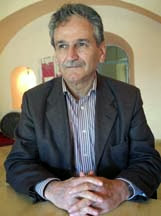Like last year's event at the V and A, the well-attended Short Stories from the Arab World was part of the Nour Festival of contemporary art, film, literature, music and performance from the Middle East and North Africa. The Festival is being held in venues throughout the Royal Borough of Kensington and Chelsea from 1 October to 30 November.
Celia Shenouda (L) and Charis Bredin
The three stories translated from Arabic which were read and discussed during the evening are downloadable from the Banipal magazine website. They are Mordechai's Moustache and his Wife's Cats by Palestinian author Mahmoud Shukair translated by Issa J Boullata; Black Kohl . . . White Heart by Kuwaiti writer Mona al-Shammari, translated by Sophia Vasalou; and Ali the Red by Luay Hamza Abbas of Iraq, translated by Maia Tabet.
Members of the audience were given copies of the two issues of Banipal and the Banipal Books volume in which the stories appeared. And they were kept well supplied with drinks and delicious Arab snacks in the breaks between stories. The discussions that followed each story were lively, the diverse audience contributing rich perspectives.
The event was chaired by Margaret Obank, publisher, cofounder and former editor of Banipal magazine of modern Arab literature. The stories were read by stalwarts of the Banipal Book Club, which was founded last year and meets monthly in the meeting room of the Banipal Arab British Centre Library of Modern Arab Literature (BALMAL) located at the Arab British Centre. Charis Bredin read the first story, Mordechai's Moustache and his Wife's Cats. Shukair is well known for his gifts of satire and humour under occupation. These qualities are much in evidence in the title story of the author's first collection in English translation, published by Banipal Books in 2007.
Mordechai, a former soldier, and his wife Stella are middle-aged Israelis of modest means who are on their own now their grown-up children have left home. Stella devotes herself to her three cats while Mordechai grows his handlebar moustache. But Mordechai grows annoyed with the cats, and she in turn resents his moustache. Mordechai decides to volunteer for military service at checkpoints. Posted to the Qalandiya checkpoint he has his first close encounters with Palestinians.
"Conflicting ideas and feelings overcame him. He was almost ready to express his sympathy for these unarmed human beings waiting for a hand gesture from him," Shukair writes. "However, the security of the state was greater than all other considerations and this made him suppress his tender feelings; for these people – in the final analysis – were the enemies of Israel!" Mordechai sees the young men as potential saboteurs, possibly armed with suicide belts or machine guns.
But he can't stop himself admiring the Palestinian women. "He cast direct looks at the bodies of the young women crowding at the checkpoint. He said to himself: 'The Palestinians have beautiful girls!' And quickly compared them with the girls of Tel Aviv, thinking: 'But the girls in Tel Aviv are more beautiful.'" The story ends with Mordechai agreeing to shave off his moustache - which the Palestinians had made fun of - if his wife will get rid of her cats. Their negotiating this agreement raises questions of negotiation more generally.
Mahmoud Shukair
(L to R) Aurora Tellenbach, Margaret Obank, Celia Shenouda
There was dark humour in Mona al-Shammari's story Black Kohl . . . White Heart, read by Aurora Tellenbach. The story appears in Banipal 47, the magazine's current issue, which has a Special Feature on Fiction from Kuwait. A voluptuous young woman, Tiba, has travelled from Saudi Arabia to Kuwait to be married off to a Kuwait man. She is horrified to find her spouse is "an overweight and feeble-minded simpleton who didn’t talk like grown men did, who ate like a child, and slept like a brute." Living in the extended family she is observed by her husband's young niece, the first person narrator of the story, who is bewitched by her beauty. "Her lips are always glossed with jujube lipstick. They’re swollen like red cherries ripe for plucking. Her deep black eyes are like chestnuts; the black kohl makes them wider, and lends languor to her gaze. Her skin is the colour of milk mixed with honey." The child innocently sees how she plots an escape from the arranged marriage, and the story ends with an ingenious twist.
Mona al-Shammari
Ali the Red, read by Celia Shenouda, was published in Banipal 37, in a Special Feature on Iraqi Authors. It was the most gruesome of the three stories, shot through with various forms of violence, yet having flashes of humour. The first-person narrator was at school 20 years earlier with four boys named Ali for whom the sports master had devised monikers. Ali was Red not because of any political affiliation but because of his ruddy complexion. Now the narrator is summoned to the coroner's office to identify the corpse of Ali, whose "forehead and half of his face had been gouged by bullets." The vividly recounted story is set among workers, some toiling like Ali in a quarry, others in the harsh conditions of oilfelds where they might be buried in collapsing well-heads. An Iraqi woman in the audience found the story a reflection of the everyday brutal killings that Iraq has been suffering for years.
report and photos by Susannah Tarbush
Celia Shenouda reads Ali the Red









No comments:
Post a Comment